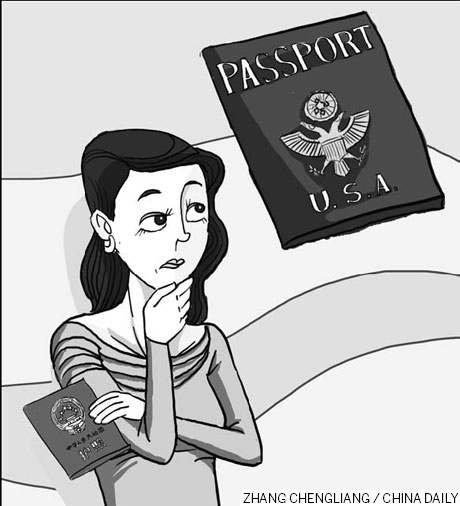Voices
Immigration frustration
By Qi Zhai (China Daily)
Updated: 2010-03-12 09:49
 |
Large Medium Small |

Immigration problems have plagued me all my life. Yet, I never gave serious thought to "upgrading" my passport. Last year, a foreign journalist in Beijing interviewed me about my passport for a story she was writing about Chinese citizens swapping their nationality for easier international travel or better education and work opportunities overseas.
Why did I hang onto my Chinese passport? Because I always felt - and wanted to remain - 100 percent Chinese. Despite spending most of my life overseas, I'm sentimental about my nationality and want to keep my unpronounceable name, "difficult" passport, the whole shebang.
This wasn't an easy choice. In the 1990s, stern officials at Xiamen International Airport scrutinized my light crimson "personal" passport and demanded a "return flight permit" each time I crossed the border. I'd never heard of such a permit, so I showed them the multi-entry visa in my passport instead. Sometimes, they didn't buy it and forced me to stay for a few days while they called Beijing to check if our countrymen were indeed allowed to leave and live overseas. It was a lot of trouble for a ten-year-old who only wanted to come visit her grandparents every summer.
I plunged deeper into the murky waters of immigration when I went to America for university. Like other international students, I went through the harrowing process of applying for an F1 student visa. My Chinese passport didn't entitle me to the usual five-year student visa. I got a three-month visa instead. Every time I left the US to visit my family or do an internship abroad, I had to schedule a visa appointment months in advance and hope that I would be allowed to return afterwards to finish my degree.
My immigration problems worsened when I started looking for a job in the US. Anti-terrorist and protectionist policies pitted me against hundreds of thousands of graduating international students. We fought for the 65,000 H1-B "white collar" visas granted each year. As I prepared for job interviews, in the back of my mind I worried: Would Company X hire me over an American? Would they submit my application early enough to get me in on the visa quota? Luckily, I made it through.
As I juggled the stresses of immigration every year, friends and family kept asking me when I would apply for the "green card" or ask my husband to sponsor me for citizenship. I thought about it, but I always concluded that if I hate getting visas to stay in other countries, I would hate it even more to get a visa to stay in my home country as a foreign-passport holder.
When at last I came back to Beijing to stay, I felt like holding out was worth it. For once, I listened to other people's problems about extending their visas to stay in China. Finally, my Chinese passport was making my life easier, not harder.
But I may have been over-optimistic. As I scoped out the job market for "sea turtles", a Chinese term for overseas returnees. I found that many Chinese companies blatantly self-discriminate in their hiring. Jobs that require excellent English skills don't stop at asking for that, they go further to stipulate "Americans, British, and Canadian applicants only."

Private companies and even some government agencies that deign to hire Chinese to fill "foreign" positions often insist on paying them less than a "real" foreigner. When the rest of the world is waking up to "equal work, equal pay", China is still deep in slumber.
In my years away, the thing that really bothered me about immigration policies is the inhumanity of it all. Many times I stood in the waiting room of foreign embassies helplessly watching grannies crying at being denied visas to visit their children overseas. I never thought this scenario would play out in my own family, in my own country.
Last month, my cousin brought his Malaysian wife and baby back to China for a long holiday. My "nephew" had been born overseas. When his "L" visa was about to expire, we went to renew it at the visa office by Lama Temple.
The first visit went badly as two visa officers rudely answered our inquiries and asked for more obscure documents to prove that the mother and child should be allowed to remain in China.
The second time, we presented the documents at three different counters and were told three different things by three officers. The last one claimed that my nephew wasn't really Malaysian because his father is Chinese. Therefore, to apply for a visa to stay he would have to renounce his Chinese citizenship first.
Talk about an absurd Catch 22: my nephew has no Chinese documents to renounce. Yet, if our immigration policy is to forcibly recognize him as Chinese, then why isn't he allowed to overstay his visa to be with his father? In the end, my cousin sadly sent his wife and baby back to Malaysia.
After sticking it out through the problems that my passport gave me in the years that I lived overseas, the last thing I expected was for it to give me trouble when I came home. For my cousin and me, staying loyal to our nationality hasn't led to a rewarding or welcoming return. My disappointment and frustration this time might just be enough to get me in line to apply for the "green card" right away.







